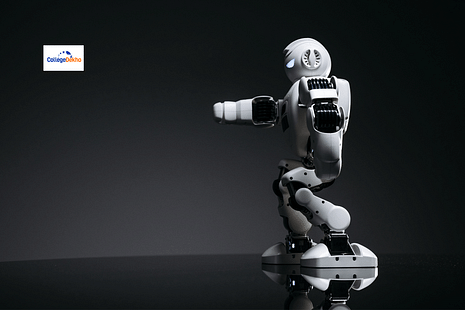Planning to join the line of work in robotics engineering? Get the career guide on how to build a career in robotics engineering on this page.

How to Build a Career in Robotics Engineering: Candidates who have a zeal and passion for the robotics world and want to join the robotic industry and wondering how to make a profession in robotics? This article is a one-stop guide on how to build a career in robotics engineering. A Robotics engineering, a captivating and multidisciplinary field, revolves around the creation and deployment of autonomous robotic systems. Eligibility for aspiring robotics engineers typically demands a strong academic foundation in mathematics and science, coupled with a bachelor's degree like BE or BTech in Robotics or BTech M echatronics Engineering or a related discipline . To make a career in robotics engineering candidates can start by pursuing an undergraduate engineering degree and get hands-on experience, achieved through robotics projects, internships, or participation in robotics clubs, and bootcamps which is crucial for personal and professional growth in this field. Some of the top robotics engineering colleges in India are IIT Madras, IIT Kanpur, Manipal Institute of Technology, IIT Guwahati, etc. The robotics industry is flourishing, offering a wealth of opportunities for those passionate about shaping the future. The robotics engineering salary in India is around INR 5.5 LPA on average and it ranges from INT 2 LPA to INR 8 LPA or even more. As the demand for automation and innovation continues to rise, a career in robotics engineering promises an exciting and rewarding journey into the world of cutting-edge technology. From designing autonomous vehicles that redefine transportation to developing surgical robots that revolutionize healthcare, robotics engineers play an important role in advancing technology and upgrading human life.
The following articles highlight about on how to build a career in robotics engineering and cover important details on what skills are required, top robotics engineering colleges in India, robotics engineering salary and more.
Also Read: Top Colleges for B.Tech Robotics in India
What is Robotics Engineering?
Robotics engineering is a multidisciplinary engineering discipline concerned with the design, building, operation, and application of robots and autonomous systems. It incorporates many engineering disciplines, such as mechanical, electrical, computer science, and control engineering, to construct robots capable of executing tasks independently or with human assistance.
By studying robotics engineering courses, you will work at a computer creating new goods or at a workstation putting together prototypes for testing. Some robotics experts supervise robots while they work on assembly lines on-site at industrial facilities. You can select from a wide range of robotics engineering specializations that match your interests and abilities. As an example, some robotics engineers make robotic arms for the automotive sector, while others work on the development of space exploration robots and others create specialized robots to aid in medical procedures or the military.
Robotics engineers work on all aspects of a robot, from original design through control software development. You will analyze robotic systems, make any required adjustments, and run tests to guarantee robots work properly and satisfy industry requirements before allowing people to use them.
Also Read: List of Best Engineering Courses in India 2023
Guide on How to Build a Career in Robotics Engineering
A career in robotics engineering is thrilling and at the same time lucrative. Follow the road map on how to build a career in robotics engineering given below.
Step 1: Get a Bachelor’s Degree
After completing your class 10+ 2, you must get admission into a bachelor’s degree like BE/ BTech in Robotics/Mechatronics Engineering, BTech in Mechanical Engineering , BTech in Computer Science Engineering , etc., or other relevant degree. A number of colleges provide bachelor's degrees in robotics engineering. You must choose your degree as per your interest, subjects of choice, and career plans.
Computer science will prepare you for the coding elements of the work, whereas mechanical engineering will prepare you for developing the hardware of a robot. Before choosing on a major, you should assess your interests and decide which components of this vocation are most interesting to you.
Also Read: Computer Science Courses
Step 2: Acquire Relevant Technical and Interpersonal Skills
Robotics engineering is a complex field of engineering and to master it and become a professional expert in this domain it is important that you are well-equipped with certain technical skills like programming, C, C++, Python, creative thinking skills, problem-solving, etc.
You can master these skills by doing more self-study, working on personal projects in your spare time, or interning at a robotics business. Boot camps, for example, are a great method to jump-start or transfer your career since they focus on building certain abilities and preparing you for this area of work. A coding or data analytics boot camp, for example, will teach many hard skills applicable to robotics engineering while also providing career assistance and networking possibilities.
Consider applying for internships at robotics firms, which give the opportunity to grow your network of connections and gain mentoring from experienced experts in your industry, if you want to learn via on-the-job, practical experience that will set you up for success in your future. Personal robotics projects are another good method to get experience.
Also Read: Free Online IT Courses After 12th
Step 3: Secure a Job
After completing your bachelor’s degree in robotics you should start looking for a job. If you hold a degree from a top engineering college in India you will get various good salary packages through college placements only. However, you can find employment on your own as a robotics engineering degree is in demand. Spend some time going through job posting sites to see what's available, and think about where you want to specialize within the field. When creating your CV, be sure to showcase all applicable robotics experience and education, whether it's a math major in college or a robot you made to sort your mail at home.
After applying for jobs, you will get shortlisted at some places where you must appear for further rounds like interviews, and group discussions following that as per your performance, you will get a job.
Step 4: Become a member of a professional association
Networking is an essential element in securing a job or adding more credentials to your profession. Joining one of the professional associations will provide you access to thousands of robotics engineers to learn from as well as beneficial seminars and conferences. Making professional relationships in the field of robotics engineering will not only help you find an exceptional job, but will also help you become a better, more skilled, and more well-rounded engineer.
The Association for the Advancement of Artificial Intelligence (AAAI) is a non-profit organization dedicated to "advancing the scientific understanding of the mechanisms underlying thought and intelligent behavior, as well as their embodiment in machines."The IEEE Robotics and Automation Society has a similar goal and likewise offers conferences and workshops on a regular basis.
Also Read: How to Become a Robotics Engineer
Top Robotics Engineering Colleges in India
There are several engineering colleges in India that offer courses of robotics and related fields in which candidates can take admission like
Career Options After Robotics Engineering
A career in robotics engineering is the gateway to a world of invention and opportunity. The employment opportunities for robotics engineers change along with the industry's ongoing development. For individuals with a love for technology and a drive to change the future, this dynamic career offers a varied range of options like
Career Options | Job Description |
|---|---|
Robotics Engineer | A robotics engineer creates prototypes, constructs and tests machines, and updates the software that manages them. Additionally, they investigate the most affordable and secure way to make their robotic systems. |
Automation Engineer | Automation engineers are professionals with the knowledge, skills, and abilities to design, develop, manufacture, and manage equipment and systems, such as automated factories, automated processes, and automated warehouses. |
Design Engineer | Design engineers do research and create designs for projects in a variety of industries, including manufacturing, software, and the construction industry. They oversee the process of making their plans a reality and tweak current goods or designs to boost effectiveness or performance. |
Factory Automation Engineer | An automation engineer utilizes technology to enhance, simplify, and automate production, power generation, warehouse distribution, mining, and many other activities to minimize the need for human intervention and maximize efficiency. They are in charge of organizing, putting into practice, and maintaining such technology. |
Robotics Engineering Salary
The robotics engineering salary in India is INR 5.5 LPA on average. Candidates with 1 to 7 years of experience in robotics engineering can earn between INR 2 LPA to INR 8 LPA or even more. Various factors play important roles in determining the robotics engineering salary like a candidate’s educational background, experience, skills, types of employer, etc.
Candidates can go through the robotics engineering salary for various career options given below.
Career Options | Annual Salary |
|---|---|
Robotics Engineer Salary | INR 5.5 LPA |
Automation Engineer Salary | INR 6.5 LPA |
Research Engineer | INR 7 LPA |
Design Engineer | INR 3.5 LPA |
Factory Automation Engineer | INR 4.5 LPA |
Skills to Make a Career in Robotics Engineering
Being a cutting-edge, diverse subject, robotics engineering may require you to be a determined and keen learner. There are certain skills that you must possess to make a successful career in robotics engineering. Following are the important key skills that you a candidate must have to establish a prospective career in robotics engineering
- Python
- Engineering Design
- Time Management
- Creative Thinking
- Critical Thinking
- Decision-Making Skills
- Communication Thinking
- Research and Development (R&D)
- Mathematics Proficiency
- Computer Skills
- Human-machine interface (HMI)
- Computer Aided Drafting & Design ( Auto CADD)
- Attention to Details
- Automation
We hope that this post on How to Build a Career in Robotics Engineering was helpful and informative.
Are you feeling lost and unsure about what career path to take after completing 12th standard?
Say goodbye to confusion and hello to a bright future!

Was this article helpful?




















Similar Articles
Polytechnic Courses 2025: Details, Fees, Eligibility, Admission Criteria
DTE Maharashtra CAP Polytechnic Cutoff 2025: Check Previous Year's Closing Ranks
Can I Change My Category in JoSAA?
Can a Student Apply for Both JoSAA and CSAB?
TNEA Round 2 Counselling 2025: Dates (OUT), Eligible Ranks, Vacant Seats, Process, Documents
TNEA Round 3 Counselling: Dates (OUT), Eligible Ranks, Vacant Seats, Process, Documents